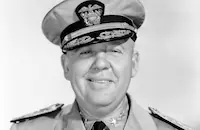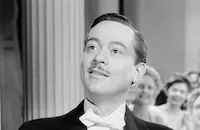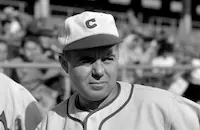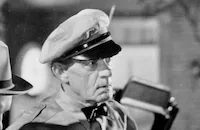It Started with Eve

Brief Synopsis
Cast & Crew
Henry Koster
Deanna Durbin
Charles Laughton
Robert Cummings
Guy Kibbee
Margaret Tallichet
Film Details
Technical Specs

Synopsis
At the city desk of the New York Daily Star Press , editors prepare the headline story, "Jonathan Reynolds Dies." At the home of the billionaire, meanwhile, his son Johnny, Jr. returns from Mexico City. Dr. Harvey tells Johnny that his father is near death, and his last wish is to meet Johnny's fiancée, Gloria Pennington. Johnny goes to Gloria's hotel and is told that both Gloria and her mother have gone out for the evening. Desperate, Johnny asks hat check girl Anne Terry to pretend to be Gloria. She does so and Jonathan takes an immediate liking to her. The next day, Jonathan awakes feeling refreshed and frisky, and, seemingly recovered, he demands to see Anne. Dr. Harvey warns Johnny that the shock of learning Anne's true identity could be fatal to his father, so Johnny is forced to continue the deception. Johnny snatches Anne away from the railway station, where she was planning to take a train back to Shelbyville, Ohio, having given up on her operatic career in New York. Back at the Reynolds' home, Johnny is surprised by the arrival of the real Gloria and her mother. While Johnny tries to explain things to Gloria, Anne learns that Jonathan has close ties to major opera figures, and convinces him to throw a party, at which she plans to demonstrate her voice. Later, Johnny contrives to tell his father that he and "Gloria" have split up, then introduce the real Gloria as his new girl friend. Anne begs him to wait until after her party, but he refuses, saying that he cannot have all of New York thinking she is Gloria. At dinner the next night, Johnny tells his father that he and Anne have broken up. Anne then bursts into the room, throwing herself at Johnny and begging his forgiveness. Johnny is forced by his father to accept her apology, but insists that she give him on a kiss. Jonathan goes upstairs to leave the two "love birds" alone, but he manages to overhear their arguing and learns the truth. Gloria and her mother then arrive, but when they see Anne and the lipstick on Johnny's mouth, they depart angrily. Anne goes upstairs to tell Jonathan the truth, but when he pretends to be sick, she says nothing. The night of the party arrives, and Jonathan is back to his old self. Johnny arrives with Gloria and her mother, and tells his father that Anne has a headache, and will not be attending. Jonathan calls Anne, and she demands that he leave her alone. Undaunted, he goes to Anne's apartment and tells her that he knows all, but insists she go out with him one last time. The two go to a fancy nightclub, where they are photographed by newspaper photographers, drink "Reynold's specials" and dance the "Conga." When Johnny and Dr. Harvey arrive, Anne throws her drink in Johnny's face, then leaves. The next day, once again Johnny stops Anne at the railway station, telling her that his father has had another attack. Back at the Reynolds' home, Jonathan reveals that he was faking once more and that Dr. Harvey is the sick one. Finally, as they chase and pinch each other around the living room, Johnny and Anne admit their true feelings for each other. Jonathan watches with amusement, then heads upstairs, smoking one of his forbidden cigars.

Director

Henry Koster
Cast

Deanna Durbin

Charles Laughton

Robert Cummings

Guy Kibbee

Margaret Tallichet
Catharine Doucet

Walter Catlett
Charles Coleman
Leonard Elliott

Irving Bacon
Gus Schilling
Wade Boteler
Dorothea Kent
Clara Blandick
Lucille Ward
Dora Clemant
Wilson Benge

Marie Mcdonald
Dorothy Darrell

Alexander Granach

Rosalind Ivan

John Eldredge

John Hamilton
George Lessey
Leon Belasco
Paul Porcasi
Mary Gordon

Sig Arno
George Davis
Jack Mulhall
Tim Ryan

Ray Walker
Selmer Jackson

Mantan Moreland
George Lewis
Nora Cecil
Walter Tetley
Sarah Padden
Robert Homans

Lew Kelly
Edgar Licho
Jessie Perry
Gretl Sherk
Tom Seidel
Leonard Sues
Ernest Grooney
Frances Brix
Bert Moorhouse
Lowell Drew
Chick Chandler
Ferdinand Munier
Florence Shirley
Herbert Rawlinson
Mira Mckinney
Mary Currier
Charlotte Treadway
John Banner
J. W. Johnston
Crew
Bernard B. Brown
Bernard W. Burton
Antonín Dvorák
William Arms Fisher
R. A. Gausman
Philip Karlstein
Henry Koster
Hans Kraly
Norman Krasna
Joseph Lapis
Samuel Lerner
Albert Hay Malotte
Rudolph Maté
Martin Obzina
Jack Otterson
Joe Pasternak
Charles Previn
H. J. Salter
Mrs. M. T. E. Sandwith
Andres De Segurola
Peter Ilyich Tchaikovsky
George Thomas Jr.
Leo Townsend
Valdesti
Joaquin Valverde
Vera West

Photo Collections
Videos
Movie Clip



Film Details
Technical Specs

Award Nominations
Best Score
Articles
It Started With Eve
Durbin plays Anne Terry, a struggling singer who works as a hatcheck girl and is persuaded by young business tycoon Johnny Reynolds (Cummings) to pretend to be his fiancée to please his father, Jonathan Reynolds, Sr. (Laughton), who is thought to be fatally ill. Comic complications ensue when the senior Reynolds regains his health and Johnny's real fiancée, gold-digger Gloria Pennington (Margaret Tallichet) protests the ruse. The expert supporting cast includes Clara Blandick (Auntie Em from The Wizard of Oz, 1939) as an overly attentive nurse, Walter Catlett as a physician with symptoms of his own and Leon Belasco as a couturier who prematurely provides Gloria with fashionable mourning clothes.
According to a magazine article of the time, Durbin was earning approximately $5,000 per week during this period, including royalties from various recordings and merchandise (dolls, clothing articles, fictional stories, etc.), with an additional $100,000 bonus each year "upon the completion of her two obligatory films." She would continue in films through 1948, but It Started with Eve marked the peak of her career as a singing ingénue. After Pasternak and Koster had moved on to other studios, her career at Universal would lose much of its luster as the studio struggled to find suitable vehicles for its maturing star. None of them would match the prestige and appeal of her Pasternak/Koster movies; it was generally considered that the poor quality of some of her later films led to her retirement.
Laughton, to look convincing as a man hovering near death, lost 40 pounds before filming began and wore oversized clothes and special makeup to make him look even gaunter; he is all but unrecognizable. The early scene on his supposed deathbed allows him to show his acting chops and gain audience sympathy, and the fact that the Cummings character is attached to someone else (for a time) allows Durbin to turn her sympathetic attention to the older man in many scenes. The Durbin/Laughton combo generates an onscreen rapport that gives particular warmth to their encounters. Their chemistry proved so potent that they would make a second film together, Because of Him (1946). The two also enjoyed each other off-camera; Durbin referred to Laughton in interviews as a "special friend" among her costars, and that friendship continued until his death in 1962.
Durbin and Cummings had become chums while costarring in two earlier films, Three Smart Girls Grow Up (1939) and Spring Parade (1940). They also saw each other socially and enjoyed a lighthearted, teasing relationship. Durbin had just married Vaughn Paul, an assistant director on some of her early films, and during filming of It Started with Eve the newlyweds spent a weekend at the home of Cummings and his wife, Vivien. On the set the following Monday, Durbin complained that she was so sore from all the laughter that she couldn't sing properly. Cummings was on quite a busy schedule, filming Kings Row (1942) at Warner Bros. simultaneously with It Started with Eve.
Durbin and Cummings, sometimes to the annoyance of director Koster, mischievously tried to break each other up in their more serious scenes. When playing opposite each other in profile, both did distracting things with the off-camera sides of their faces. Cummings would look only into Durbin's left eye, leading her to burst into giggles and exclaim, "I can't stand the way he looks at me. It makes me feel one-sided!" She, in turn, would regard him tenderly with one side of her face while the other, unseen by the camera, would distort into grotesque grimaces and smirks. The playfulness enlivened their more lighthearted scenes, such as a romantic encounter when, to cool his ardor, she bites his ear.
Musical highlights include a funny conga by Durbin and Laughton and, of course, Deanna's singing. She performs When I Sing from Tchaikovsky's Sleeping Beauty; Goin' Home from Dvorak's From the New World; and, notably, a lightning-fast Clavelitos (at a reported 157 words per minute, in Spanish!) by Albert Hay Malotte, while accompanying herself on the piano. Also at the piano, she performs an excerpt from Tchaikovsky's Piano Concerto No. 1.
It Started with Eve opened in New York City on October 2, 1941, the only one of Durbin's movies to premiere at Radio City Music Hall. The film, another box-office winner for Durbin, received positive reviews; in The New York Times Bosley Crowther called it "light and unpretentious fare" that "should please - as they say - both young and old. It's the perfect '8-to-80' picture." He went on to praise director Koster for getting "the best out of Mr. Laughton, that man of great reknown... Mr. Laughton plays with flavor, mischief, humor and great inventiveness." Crowther also noted that "Miss Durbin is as refreshing and pretty as she has ever been and sings...with lively charm."
It Started with Eve, originally titled Almost an Angel, received an Oscar nomination for Best Original Music Score (Charles Previn and Hans J. Salter). It was remade by Universal in 1964 as I'd Rather Be Rich, with the genders of the romantic leads switched. Robert Goulet played a variation of the Durbin role, with Sandra Dee in the Cummings part and Maurice Chevalier as the dying grandfather. Before that, Laughton had repeated his role in two radio adaptations of the movie, one by Lux Radio Theater in November 1944 and the other by Screen Guild Theater in April 1950.
By Roger Fristoe

It Started With Eve
Quotes
Trivia
Notes
The working titles of this film were Almost an Angel and It Started with Adam. This film was originally scheduled to begin production in March 1941, but was delayed until May 1941 due to the extended honeymoon of star Deanna Dubin and her husband, Vaughan Paul. An undated Hollywood Reporter news item found at the AFI Library includes Universal contract player Elaine Morey in the cast, but her appearance in the released film could not be confirmed. Hollywood Reporter production charts for early June 1941 include Richard Carle in the cast, but his appearance in the released film has not been confirmed. New York Times reported in July 1946 that this was one of the first American films to be shown to German civilians upon the conclusion of World War II.
It Started with Eve was the last Universal film made by noted producer Joe Pasternak, who signed a long-term contract with M-G-M prior to its production. Hans Kraly's screen story for the film was the basis for two other pictures: a 1964 Universal film called I'd Rather Be Rich, starring Sandra Dee, Maurice Chevalier, Robert Goulet and Andy Williams, directed by Jack Smight and co-written by Norman Krasna (see AFI Catalog of Feature Films, 1961-70; F6.2356); and a 1973 German production, Oh Jonathan, Oh Jonathan, starring Heinz Ruehmann, Peter Fricke and Franziska Oehme, written and directed by Franz Peter Wirth. In 1956, the NBC network broadcast a Lux Video Theatre version of Kraly's story, also titled It Started with Eve, starring Thomas Mitchell, David Janssen and Joan Sinclair, and directed by Cal Kuhl. For their work on t Started with Eve, Hans Salter and Charles Previn were nominated for an Academy Award for Achievement in Music (Scoring of a Musical Picture), but lost to Ray Heindorf and Heinz Roemheld for Yankee Doodle Dandy.














